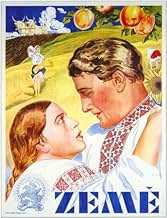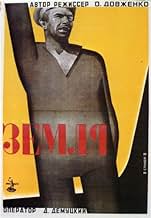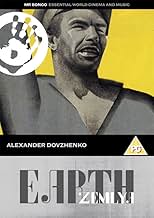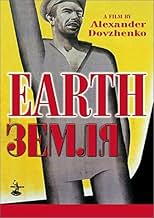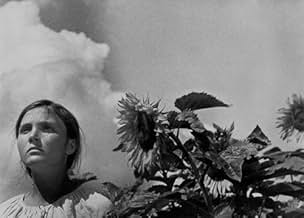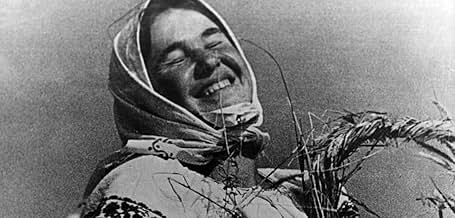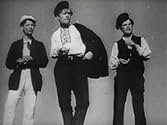AVALIAÇÃO DA IMDb
7,2/10
6,8 mil
SUA AVALIAÇÃO
Na zona rural pacífica, Vassily se opõe aos ricos kulaks pela chegada da agricultura coletiva.Na zona rural pacífica, Vassily se opõe aos ricos kulaks pela chegada da agricultura coletiva.Na zona rural pacífica, Vassily se opõe aos ricos kulaks pela chegada da agricultura coletiva.
- Direção
- Roteirista
- Artistas
- Prêmios
- 1 vitória e 1 indicação no total
Stepan Shkurat
- Opanas
- (as S. Shkurat)
Semyon Svashenko
- Vasyl - son of Opanas
- (as S. Svashenko)
Yuliya Solntseva
- Daughter of Opanas
- (as Yu. Solntseva)
Yelena Maksimova
- Natalya - Vasyl's fiancee
- (as Ye. Maksimova)
Nikolai Nademsky
- Ded Semyon
- (as N. Nademsky)
Ivan Franko
- Kulak Belokon
- (as I. Franko)
Pyotr Masokha
- Khoma - son of kulak Belokon
- (as P. Masokha)
Vladimir Mikhaylov
- Priest
- (as V. Mikhaylov)
Pavel Petrik
- Young Party-Cell Leader
- (as P. Petrik)
P. Umanets
- Chairman of the Village Soviet
- (as Umanets)
Luka Lyashenko
- Young Kulak
- (as L. Lyashenko)
Vasiliy Krasenko
- Old Peter
- (não creditado)
M. Matsyutsia
- Farm Girl
- (não creditado)
Avaliações em destaque
Stalin may have wanted an ode to collective agriculture; what he got instead was a hymnal to mother nature and the toiling offspring who dwell in her bosom. Those opening shots of pulsating fields waving in the wind have no equal for sheer evocative power. Earth is revealed at once as a living, breathing being and bountiful provider. Flower, fruit, decay, renewal -- nature's timeless cycle. The soundless imagery is at times so wonderfully lyrical that contemporary viewers may be led to recognize how much has been lost to the technology-driven cinema of today. Even the occasional plot crudities are rescued by a style that is both brilliant and unerringly pictorial. Close-ups of weather-worn peasants, a lone kulak and oxen beneath an immense sky, great rolling plains and far horizons of the Ukrainian breadbasket -- this is the sheer lyrical sweep of the Dovchenko masterpiece, a montage that transcends all obstacles, real and man-made. Not even the estimable John Ford frames primitive elements as grandly as this. There are flaws. Too many rushing crowd scenes appear without purpose, except to mimic Eisenstein's "march of history", while the propaganda thread at times blends uneasily with the lyrical. Still and all, Dovchenko pulls off the theme of new beginning more seamlessly than might be expected. Far from being a mere relic of the silent era, or an ode to Stalinist collectivism, Earth remains an enduring testament to the power of cinema as sheer visual poetry.
Now I regret all the times I've railed about how propaganda is synonymous with contempt for the audience. It is sometimes hard to know what to say about a movie when it is a 'best of all time list' warhorse, but not this time. I have never - ever - seen a movie with a more deliberate, or surer, sense of rhythm. Two sequences that are nothing but long montages of fruit are absolutely riveting. A man sits, re-evaluating his world view, and because it takes a long time to do that we fade to black THREE times over about a minute, without him moving or changing position. This glacial tempo lulls us, so that Dovzhenko can jolt us with the arrival of a speedy tractor; or a collectivo's joyous dance through the dust over several lengthy wide shots is disrupted by his abrupt murder. Then the movie climaxes with an unbelievable crescendo where at least FIVE events are montaged, in perfectly comprehensible rhetorical construction. The movie begins with a death scene whose understated acting is mind-boggling even now, forget 1930; the final shot balances all the anti-church rhetoric with an image that is absolutely redemptive and spiritual, only the point is that redemption is found in LIFE. I'm not being pompous, this movie actually functions on that level. It achieves poetry AND propaganda in a way that I've never ever experienced before. It kind of reminds me of Brian Wilson's "Smile" in its modest grandeur, so true that it's painful, but so f***ing great that you want to experience it again and again. You can get it for free at the St. Catharines Library.
10miloc
From its opening, with an elderly man dying surrounded by impassive adults and obliviously playing children, to its wildly emotional finale, this breathtaking silent work transcends its politics and functions as poetry. It's unmistakeably Soviet -- the messianic fervor of the scene in which the farming community greets the arrival of a tractor would seem like parody if it weren't for Dovzhenko's extraordinary sense of lyricism. Using repeated shots of the expectant farmers crying out "It's coming!" intercut with an empty horizon, he builds the moment so completely that you're excited in spite of yourself; you totally believe in that tractor. (As one of the "rich farmers" says, shellshocked by this threat to their future, "It's a fact. It's here.")
To call the film propaganda, while true, seems rather beside the point. Aren't all films? Dovzhenko's manipulations are certainly no less devious than those of western film. Switch the communist message to a patriotic or even capitalist one, and the setting to the World War II Pacific or the old west or wherever you choose and it's no different than, say, "Shane" or "Gone With the Wind" or "The Passion of the Christ" -- just much, much better.
The story, told in rich montages of motionless figures, fruit, machinery, skies, rippling fields, and above all faces, weaves its "official" message about collective farms and private property with larger themes of religion, the generation gap, and the cycle of life: the Earth that gives life takes it away. A group of children giggle and spy on an old man listening at his friend's grave for a last message; a man sits up on his deathbed to eat a last sweet pear; a serious young radical, alone, gives himself up to a joyful moonlit dance before falling into the dirt. Dovzhenko's approach has less to do with narrative than with creating visual textures; it looks as though Terrence Malick watched this more than a few times before making "Days of Heaven." Dovzhenko's discontinuities and repetitions can be initially bewildering, but they pack a concrete wallop. The images accumulate and crystallize, carrying greater and greater weight, and, as an aging farmer becomes suddenly radicalized by tragedy, the direct shots of his face, hardening in bewilderment and outrage, take on a thunderous power.
To call the film propaganda, while true, seems rather beside the point. Aren't all films? Dovzhenko's manipulations are certainly no less devious than those of western film. Switch the communist message to a patriotic or even capitalist one, and the setting to the World War II Pacific or the old west or wherever you choose and it's no different than, say, "Shane" or "Gone With the Wind" or "The Passion of the Christ" -- just much, much better.
The story, told in rich montages of motionless figures, fruit, machinery, skies, rippling fields, and above all faces, weaves its "official" message about collective farms and private property with larger themes of religion, the generation gap, and the cycle of life: the Earth that gives life takes it away. A group of children giggle and spy on an old man listening at his friend's grave for a last message; a man sits up on his deathbed to eat a last sweet pear; a serious young radical, alone, gives himself up to a joyful moonlit dance before falling into the dirt. Dovzhenko's approach has less to do with narrative than with creating visual textures; it looks as though Terrence Malick watched this more than a few times before making "Days of Heaven." Dovzhenko's discontinuities and repetitions can be initially bewildering, but they pack a concrete wallop. The images accumulate and crystallize, carrying greater and greater weight, and, as an aging farmer becomes suddenly radicalized by tragedy, the direct shots of his face, hardening in bewilderment and outrage, take on a thunderous power.
What an unusual and memorable film this is, almost more like a poem or an impressionist painting than a movie. It's filled with activity and images that push the actual story into the background. Sometimes the characters overreact to events in a highly exaggerated fashion, while at other times they barely respond to what happens - yet it seems both real and believable. The movie is probably not quite as great as some would have it, but it has an unusual appeal that makes you want to watch it (or, perhaps, experience it) over again.
The scenes often have little connection with one another, and it's clear that the plot is not meant to be the main emphasis. On the surface, the story is about the collective farm, their hopes of getting new machinery, and their rivalry with the independent landowners. But it's intended to be something more subtle and worthwhile than a political message. The themes and images involving the characters and, especially, the "Earth" itself, are more vivid than the slight story-line.
To be sure, the collectivist perspective from which the film was made is rather obvious. But that does not detract from this unusual achievement. And while it would not work as light or casual entertainment, it is well worth watching, and it's a movie you won't forget afterwards.
The scenes often have little connection with one another, and it's clear that the plot is not meant to be the main emphasis. On the surface, the story is about the collective farm, their hopes of getting new machinery, and their rivalry with the independent landowners. But it's intended to be something more subtle and worthwhile than a political message. The themes and images involving the characters and, especially, the "Earth" itself, are more vivid than the slight story-line.
To be sure, the collectivist perspective from which the film was made is rather obvious. But that does not detract from this unusual achievement. And while it would not work as light or casual entertainment, it is well worth watching, and it's a movie you won't forget afterwards.
This is one of those "critics' darlings" titles that frequently crops up in "All-Time Best Films" polls; however, it is also one which certainly seems to have lost its edge with the passage of time. While I am generally a fan of politically-themed movies, I have always admired the early Russian classics for their pioneering use of film language but found them oppressively heavy-going viewing overall. This belated Silent is considered to be its director's masterwork and, despite the brevity of its running time (70 minutes), this standard opinion holds true regardless, notwithstanding the relative simplicity of its plot: tragedy strikes a farming community when oncoming progress (the use of a new tractor to plough the land in place of the old horse-driven method) divides it into two factions.
The intertitles on the copy I acquired (taken from the Kino DVD) are stiltedly Americanized and the acting style is typically hammy; what ultimately saves the film and preserves its reputation as a precious cinematic document are the strikingly lyrical compositions – highlighted by the extended funeral sequence of the murdered tractor driver which is powerfully intercut with the breakdown of the killer in a field, the lonely naked wife of the murdered man in the throes of sexual frenzy, a middle-aged villager going through labor pains, an elderly priest invoking a curse upon the godless community that has shunned him and an impromptu political rally by the mourners!
The intertitles on the copy I acquired (taken from the Kino DVD) are stiltedly Americanized and the acting style is typically hammy; what ultimately saves the film and preserves its reputation as a precious cinematic document are the strikingly lyrical compositions – highlighted by the extended funeral sequence of the murdered tractor driver which is powerfully intercut with the breakdown of the killer in a field, the lonely naked wife of the murdered man in the throes of sexual frenzy, a middle-aged villager going through labor pains, an elderly priest invoking a curse upon the godless community that has shunned him and an impromptu political rally by the mourners!
Você sabia?
- CuriosidadesSoviet censors made Aleksandr Dovzhenko eliminate a number of scenes from the film, including the scene of peasants urinating into a tractor radiator, and the scene of nude woman mourning over her dead fiance. The original uncut version was screened in Ukrainian republic when first released, and then in the Museum of Modern Art (New York City, USA) about 40 years later, on 10 October 1969.
- Versões alternativasIn 1997, the film was re-released in Germany by ZDF, with a new score composed by Alexander Popov. This version was digitally improved (known as Arte Edition), then released on DVD and distributed by the absolut MEDIEN GmbH in 2006. The running time is 78 minutes. The crew participants:
- Alexander Popov, Composer;
- Frank Strobel, Conductor;
- Evgeniy Nikulskiy, Sound engineer;
- Nina Goslar, Commissioning editor.
- ConexõesEdited into Le tombeau d'Alexandre (1993)
Principais escolhas
Faça login para avaliar e ver a lista de recomendações personalizadas
- How long is Earth?Fornecido pela Alexa
Detalhes
- Tempo de duração
- 1 h 15 min(75 min)
- Mixagem de som
- Proporção
- 1.33 : 1
Contribua para esta página
Sugerir uma alteração ou adicionar conteúdo ausente


